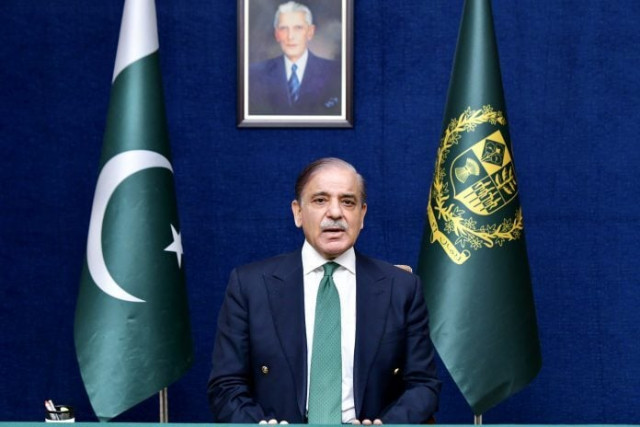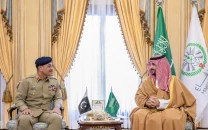PM rejects budgetary proposals
Forms seven special committees to fine-tune recommendations for pro-poor spending

Prime Minister Shehbaz Sharif has set up multiple special committees to finalise a new budget after finding shortcomings in the finance ministry’s proposals, as the government desperately looks for fiscal space to spend in areas that can help increase the vote bank.
Sources told The Express Tribune that the prime minister did not endorse some of the allocations that the ministry proposed as part of Rs14.6 trillion budget for the next fiscal year 2023-24.
In order to improve the budget-related working, Prime Minister Shehbaz has set up seven committees. Defence Minister Khawaja Asif is leading the most important group concerning pro-poor expenditures.
The Asif-led group will recommend measures for allocating money for increase in salaries, pensions, subsidies and grants – a task that used to be the core business of the finance ministry at the time of budget-making.
The sources said that the group has held two meetings so far, and will submit its findings to the prime minister next week.
They added that the proposals might include diversion of subsidies to fertiliser plants to the farmers and more funds for electricity subsidies to the lifeline consumers.
The finance ministry has proposed Rs14.6 trillion budget outlay for the next fiscal year, which is 52% higher than the current budget. But half of the budget is being spent on interest payments that has put the government in a tight spot ahead of the elections when it is expected to face angry voters being ruined by 59-year-high inflation rate of 36.4%.
Read PM Shehbaz arrives in Karachi on day-long trip
According to the sources, the prime minister found some of the finance ministry’s proposals not at par with his requirements, therefore, he constituted seven committees to further fine tune these recommendations.
These committees work in the areas of agriculture, revenue measures, information technology, energy, pro-poor expenditures, development budget and industrial growth.
Every committee will submit its recommendations directly to the prime minister.
On Friday, Prime Minister Shehbaz publicly censured Federal Board of Revenue (FBR) Chairman Asim Ahmad, saying that he was “extremely angry with him [Asim]” because of the poor performance of the FBR. Highlighting the growing revenue leakages, the prime minister even went on to say that Asim’s noble deeds were of no use.
Asif chaired the pro-poor expenditure group meeting on Friday in which the possibility of further increasing the FBR’s Rs9.2 trillion proposed tax target and using the additional fiscal space for giving targeted subsidies was discussed.
The sources said that Asif’s committee, which is holding its meetings in the finance ministry building, reviewed over Rs1.25 trillion proposed allocations for various subsidies for the next fiscal year.
Some committee members suggested that the FBR was collecting taxes far less than its potential and that its target should be increased against the proposed Rs9.2 trillion, the sources added.
For this fiscal year, the government gave a target of Rs7.640 trillion to the FBR but it was now expecting that the FBR might not even cross Rs7.2 trillion despite imposition of heavy taxes through a new budget in February this year.
Out of the proposed over Rs1.25 trillion total subsidies, an amount of Rs975 billion has been earmarked for power subsidies.
The sources said that some of the members were of the view that the subsidy allocations for the agriculture tube-wells were being misused.
Of a total Rs150 billion being given to all the consumers from across Pakistan in the form of subsidies, except the K-Electric clients, an amount of Rs85 billion has been proposed for hardly 300,000 tube-wells.
The committee suggested that some of these funds should be diverted towards lifeline residential consumers and their subsidies should be increased.
Read more Shehbaz sees Rs700b PSDP insufficient
The sources said that the special committee was also seeking more increase in the salaries of the employees as against the Ministry of Finance’s proposal to give a 20% surge.
The committee was looking for at least a 30% increase in the salaries, which is in line with the prevailing average inflation rate in the country.
Similarly, the committee members also recommended that the Rs30 billion proposed subsidy for the fertiliser plants should instead be directly given to the farmers aimed at creating more impact.
There was also a suggestion that another Rs30 billion subsidy for the Utility Stores Corporation (USC) under the prime minister’s package should be used for other productive purposes, as there were huge leakages and the sale of substandard goods.
At least Rs50 billion to Rs100 billion savings can easily be made out of the proposed over Rs1.25 trillion subsidies and can be used for more productive and result-oriented purposes, a member of the committee told The Express Tribune.
The sources said that the government would retain the wheat subsidies for Gilgit-Baltistan but the subsidy for metro buses would also be reduced to Rs2 billion in the jurisdiction of Islamabad. The government will also fund the subsidised home loan schemes in the next fiscal year too.
“The [Asif-led] committee is aiming at recommending those measures to the prime minister that can help lower the cost of food and electricity for the households and we are hopeful of creating the fiscal space for this purpose,” a committee member said.



















COMMENTS
Comments are moderated and generally will be posted if they are on-topic and not abusive.
For more information, please see our Comments FAQ